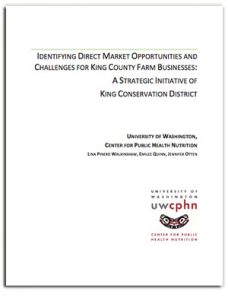King County small and mid-sized farms could benefit with direct marketing support, according to report
King County farmers who sell direct to consumers, restaurants, and institutions could benefit by receiving support for direct marketing resources, according to a new report last week by the University of Washington Center for Public Health Nutrition (CPHN).
The study was sponsored by King Conservation District (KCD), a natural resources assistance agency authorized by Washington State, and aimed to understand the current state of King County’s direct market farm economy, and the perceived challenges and areas of opportunities where farmers could use support in relation to direct marketing.
The study found that most King County farmers wanted to expand their direct market customer base and sales and that on-farm sales, farmers markets, and Community Supported Agriculture (CSAs) comprised the greatest percent of sales for farmers. Farmers appreciated these markets for the relationships they create between customers, the community, and farmers and because they can return greater profit margins, however farmers felt they could do better with more marketing and advertising support and better consumer education about the value of their products.
Lina Pinero Walkinshaw, a research scientist on the project says, “People who have seen the report thus far have been excited to hear the results, and feel the report resonates with what they’ve experienced and have heard in the community.” So far, the project team has heard from KCD, representatives at King County, and other farm and agricultural stakeholders.
UW researchers surveyed King County farmers in 2018 as part of this project to determine their specific market needs and challenges and to identify strategies farmers could use to scale up their businesses and establish sustainable business models.
King County farmers who sell directly to consumers include markets such as: farmers markets, Community Supported Agriculture (CSAs), pick-your-own operations, on-farm sales, and roadside stands. The report also examines King County farmers’ experience selling directly to schools, hospitals, grocery stores, and restaurants.
Jennifer Otten, associate professor and principal investigator for the project, anticipates King County, the City of Seattle, as well as other agricultural stakeholders in the region, including state and local farmers market groups will find this report useful. Otten has also found that there is increased recognition that these markets could help some farmers survive, succeed, and grow in a risky and competitive business environment.
Researchers expect the findings will be used to inform future grant initiatives and strategic initiatives, as well as to support KCD in brainstorming with partners how to best support farmers to grow a strong direct market economy.
Authors contributing to this report include Lina Pinero Walkinshaw, a research scientist with the Center for Public Health Nutrition, Emilee Quinn, a research coordinator with Center for Public Health Nutrition, and Jennifer Otten, a researcher with the University of Washington Center for Public Health Nutrition, and an associate professor in environmental and occupational health sciences and nutritional sciences.
Learn more about the project and read the report
May 16, 2019
